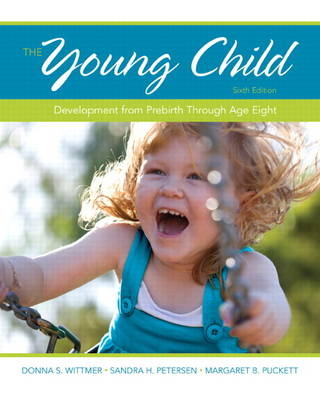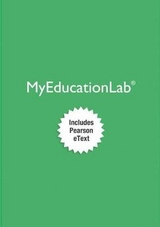
The Young Child
Pearson (Verlag)
978-0-13-294401-4 (ISBN)
- Titel ist leider vergriffen;
keine Neuauflage - Artikel merken
Pre-educators will be presented with the best knowledge on how infants' and toddlers' develop and learn with up-to-date research and new ways of thinking about children's development. The text provides comprehensive information on children's development, the role of families, how to observe young children, and curriculum development.
This revered text discusses the major and contemporary development theories as they related to physical, social and emotional, and cognitive domains, and contains extensive applications for those who teach and work with young children. As readers follow the child development cycle of growth from prenatal development through the early school-age years, they will be introduced to contemporary insights on a wide-range of interesting and pertinent topics such as:
The effect and long-term consequences of early biological and psychological experiences on brain growth and neurological development
The changing family and the ecological systems surrounding and influencing families and children
The importance of, and potential impediments to, optimal prenatal development; children's amazing development in the motor, language, cognitive, social, and emotional domains;
Increasing scholarly interest in the mental health of infants and young children.
Cultural diversity and the positive potential of varying developmental pathways.
How growth and development of children with challenges are supported.
Contemporary health, safety, and well-being issues of children and families.
How children learn and become literate.
The evolution of childhood social and moral competence.
The changing dynamics and structures in child care and early education and their effect on childhood and individual child well-being.
All of the chapters have been updated with the latest research and recent ways of thinking about development and learning, and more information has been added on brain and neurological development, more on the Early Childhood Professional Standards, essential experiences for young children and families, developmental opportunities (typical sequences of development in all domains, diversity, and the role of the Early Childhood Educator. All information supports the readers’ ability to apply the latest thinking about young children’s learning and development to optimal practices in Early Childhood Education.
Written specifically for those who teach and work with young children, The Young Child: Development from Prebirth Through Age Eight, Sixth Edition is particularly appropriate for early childhood education programs abound.
Donna Wittmer received her Ph.D. from Syracuse University in 1985 in Child, Family, and Community Studies. She was a professor of Early Childhood Education at the University of Colorado for 17 years and received Emerita status in January 2008. Donna is the author of numerous articles in Early Childhood Education Journals, including Young Children, and the co-author to a variety of early childhood education and development texts, including The importance of peers in the early years (2009) published by ZERO TO THREE Press. Sandy Petersen is the Director of Outreach, Research, and Innovation at the Early Head Start National Resource Center at ZERO TO THREE. Her previous work includes directing training and technical assistance for early childhood at the Colorado Department of Education, heading a grant to explore inclusion of medically fragile infants and toddlers in community child care, and providing infant-parent psychotherapy at the Infant- Parent Program in San Francisco. Petersen created and teaches the Special Needs workshop in the Program for Infant Toddler Care. Together, Wittmer and Petersen have co-authored the following three textbooks on development and curriculum: Wittmer, D.S. & Petersen, S.H. (2008). Issues in infant/toddler programs. In S. Feeney, (Ed.), Issues in Early Childhood Education. Upper Saddle River, NJ: Merrill Prentice Hall. Petersen, S.H., & Wittmer, D. S. (2009). Endless Opportunities–Curriculum for Infants and Toddlers. A Relationship-Based Approach. Upper Saddle River, NJ: Merrill-Prentice Hall. Wittmer, D.S., & Petersen, S.H. (2009). Infant and toddler development and responsive program planning–a relationship-based approach (2nd Ed.). Upper Saddle River, NJ: Merrill Prentice-Hall.
Chapter 1: The What and Why of Early Childhood Development
Chapter 2: The Where, When, and How of Early Childhood Study and Assessment
Chapter 3: The Family Before Birth
Chapter 4: The Child and Family at Birth
Chapter 5: Brain, Perceptual, Motor and Physical Development of the Infant
Chapter 6: Social and Emotional Development of the Infant
Chapter 7: Cognitive, Language, and Literacy Development of the Infant
Chapter 8: Perceptual, Motor, and Physical Development, Health and Nutrition: Ages One through Three
Chapter 9: Social and Emotional Development: Ages One through Three
Chapter 10: Cognitive, Language, and Literacy Development: Ages One through Three
Chapter 11: Physical and Motor Development: Ages Four through Five
Chapter 12: Social and Emotional Development: Ages Four through Five
Chapter 13: Cognitive, Language, and Literacy Development: Ages Four through Five
Chapter 14: Perceptual, Motor, and Physical Development; Health and Nutrition: Ages Six through Eight
Chapter 15: Social and Emotional Development: Ages Six through Eight
Chapter 16: Cognitive, Language, and Literacy Development: Ages Six Through Eight
Epilogue
Appendix: Acronyms Associated with Childhood-Related Terms, Agencies, and Associations
Glossary
| Erscheint lt. Verlag | 5.12.2012 |
|---|---|
| Sprache | englisch |
| Maße | 207 x 253 mm |
| Gewicht | 910 g |
| Themenwelt | Geisteswissenschaften ► Psychologie ► Entwicklungspsychologie |
| Geisteswissenschaften ► Psychologie ► Pädagogische Psychologie | |
| Sozialwissenschaften ► Soziologie | |
| ISBN-10 | 0-13-294401-4 / 0132944014 |
| ISBN-13 | 978-0-13-294401-4 / 9780132944014 |
| Zustand | Neuware |
| Haben Sie eine Frage zum Produkt? |
aus dem Bereich



